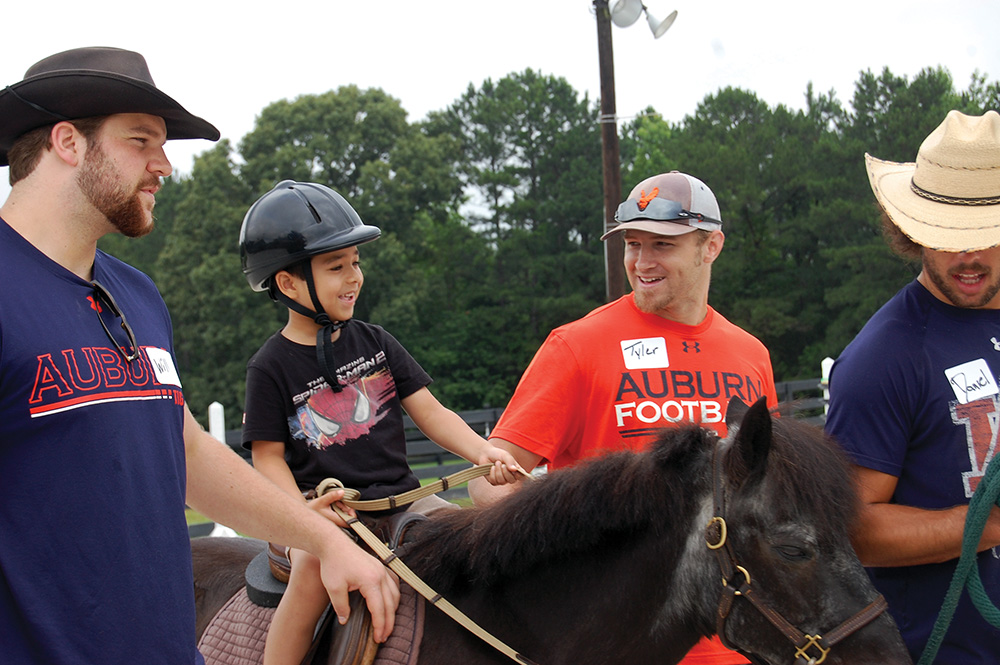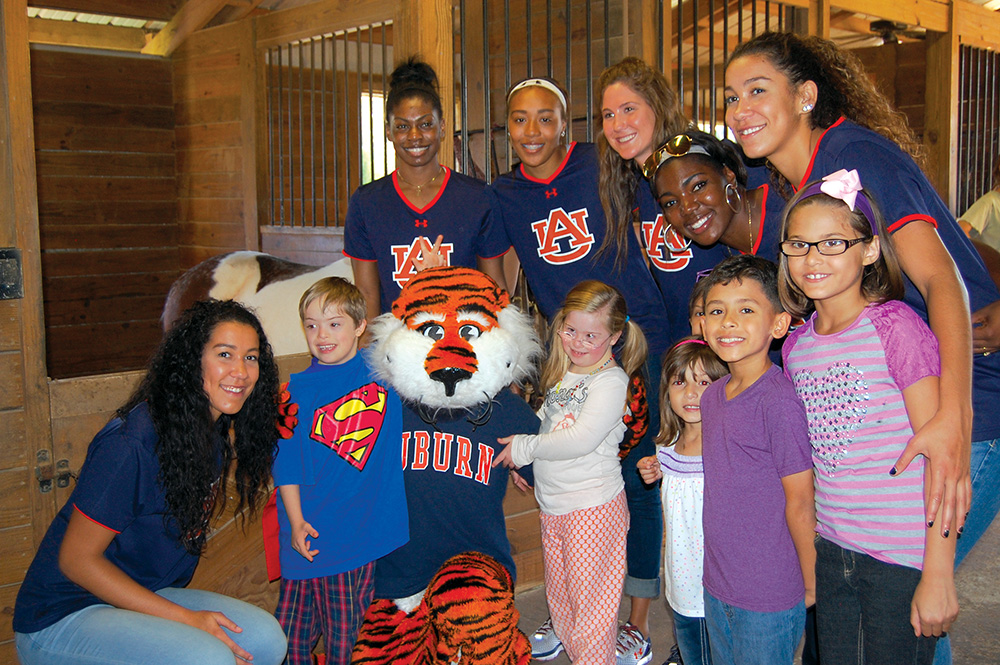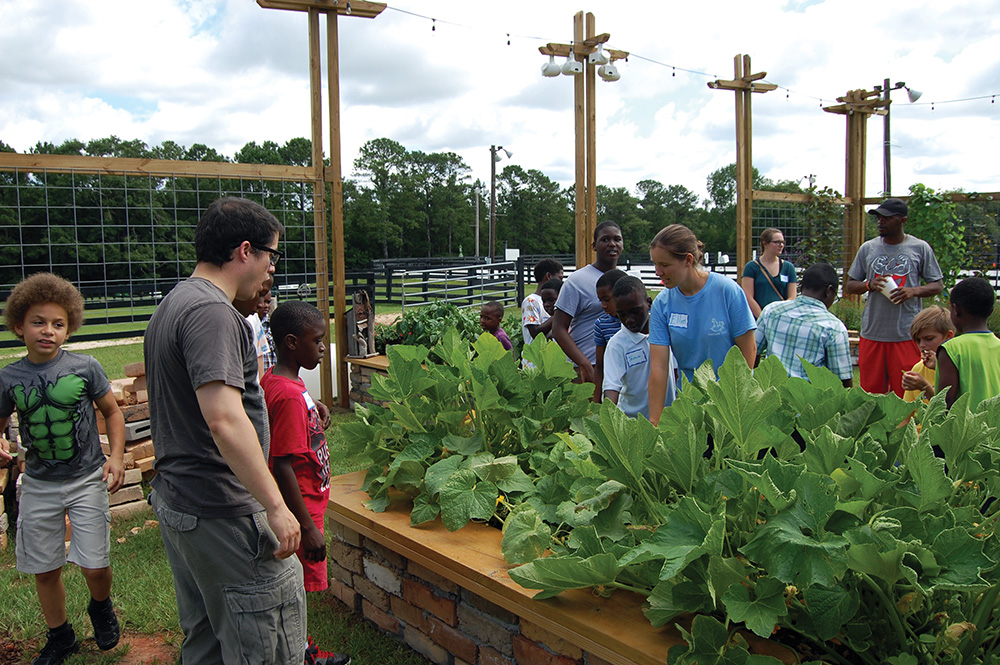
PHOTO COURTESY STORYBOOK FARM
By Lindsay Miles Penny
It all began while folding laundry.
Storybook Farm Director Dena Little was completing household chores while thumbing through Practical Horseman when she came across a story about a horse therapy farm in Virginia.
Little, who grew up caring for and competing on horses, had taken a hiatus from farm life as she ran a bakery in Atlanta and cared for her two small children. It was 2002, and she had just sold her bakery and moved her young family to a small farm in Auburn. She yearned to get back to her roots and share her love of horses with her children.
That’s when the article struck a chord.
Little immediately got in contact with the owner of the horse therapy farm in Virginia. Soon after, she gained certification for her farm to provide equine-assisted therapy for children needing support, and Storybook Farm was born.
“I really had no idea the impact that Storybook would have, or its longevity, and I didn’t realize the need for programming like this,” Little says. “When Storybook opened, we quickly had a waitlist. I felt the Lord was leading me down this path to utilize my background with horses and to translate that to helping families that are facing crises and uncertain futures. Getting to walk alongside these families has become my distinct honor.”
Children from age 2 to young adulthood who face obstacles such as autism, cerebral palsy, cognitive delays, sensory integration issues and bereavement situations come to Storybook Farm for horseback riding and weekly lesson plans, including games and activities. They learn how to care for animals and develop social skills by interacting with farm volunteers. Horseback riding also provides physical benefits such as improvements to balance, motor skills, muscle strength and coordination.
Personal attention

An English literature major in college, Little wanted to create a whimsical, real-life fairytale for every child. Willy Wonka, Mrs. Potts, Tom Sawyer and Huck Finn are just a few of the horses to come through the farm. Driving up to the farm and looking out over the lush, rolling acres immediately transports anyone into a storybook.
“We started with three children, and will have about 1,500 this year alone,” Little says. “We don’t turn anyone away. We always make it work. One of the greatest compliments a family has ever given me is a parent saying, ‘I feel like our child is the only one who rides at Storybook.’ That’s what I want it to be. I wanted it to be so personal and special for everyone who comes to the farm. Many of the children we see and serve at Storybook have ambulatory issues, and they’ve never had that mobility and that freedom to just be one of the kids. To be one of the kids and not be set apart by the condition that brought you to Storybook is so important to me.”
Not only are the children and families impacted by Storybook Farm, but the effect the farm has on volunteers is evident. With more than 300 volunteers each week from Auburn University and the community, the people at the farm are committed to carrying out the farm’s mission. 
“I started out as a volunteer not really knowing anything about children with disabilities or horses,” says Andrew Skinner, executive communications director. “I’d originally started coming out to the farm with a friend. At the time, I wasn’t doing much with my life. I remember painting a fence, and looking around seeing all the kids riding horses and smiling, and looking back at that now, I realize it was what I needed in my life at the time and that it was a little pat from God.”
Skinner quickly became part of the Storybook Farm staff, and hopes to instill an attitude of service with current and future volunteers.
“Our goal is to give these kids a chance to just be a kid,” said Skinner.
Families are referred to the farm by counselors, pediatricians and therapists, and most commonly, by word of mouth from other families.
Gardens as therapy
A newer addition to Storybook Farm is the Secret Garden. Located in the middle of the farm, the garden provides a wealth of activities to help farm goers improve memory, cognitive abilities, task initiation, language skills and socialization.

PHOTO COURTESY STORYBOOK FARM
The horticultural programming the Secret Garden provides allows those with physical limitations an opportunity to strengthen muscles and improve coordination, balance and endurance. The garden also teaches children about nutrition, caring for plants and the importance of a healthy diet.
Partnerships with Auburn University and Mobile Studio, a company that specializes in creating outdoor spaces, allowed the garden to be created with maximum accessibility in mind.
The bounty harvested from the garden is given back to the community and shared with food insecure families.
The services provided at Storybook Farm, which is served by Tallapoosa River Electric Cooperative, are free to families, thanks to funding through corporate sponsors, grants and fundraisers.
“Our biggest fundraiser is our Kentucky Derby Dinner and Auction,” Little says. “It’s grown from less than 100 people to hopefully over 500 people this year. People come dressed in their Kentucky Derby best, eat and enjoy a really fun event.”
The Kentucky Derby Dinner and Auction will be May 5. Tickets are available at hopeonhorseback.org/events/derby.
For more information on Storybook Farm’s services or volunteer opportunities, call 334-444-5966 or [email protected] or visit hopeonhorseback.org.




